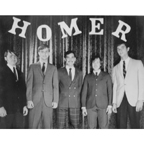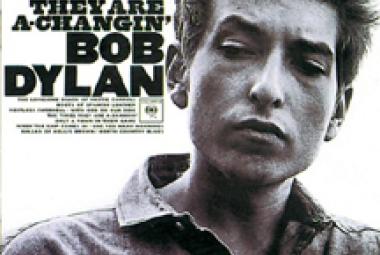UNDER-APPRECIATED ROCK BAND OF THE MONTH FOR APRIL 2014: HOMER
Galen Niles, one of the bandmembers in this month’s Under-Appreciated Rock Band, HOMER was previously in a legendary garage rock band called the Outcasts and was later in a previous UARB, Ultra. I wrote a Wikipedia article on the Outcasts several years ago and talked quite a bit about Homer already in the Ultra post.
Chet Himes and Galen Niles were the co-founders of Homer and lived at the same apartment complex when they were both in college at Texas State University. Himes recognized Niles as being in the Outcasts – which had only recently broken up – and tried to persuade him to join a band that he was putting together, but Niles said that he wasn’t interested. Himes kept at it; he recruited a lead singer, Frank Coy and a rhythm guitarist, Pat Cosgrove, so all he needed was a lead guitarist and a drummer. Finally, Galen Niles agreed to at least jam with them; he even brought in Gary Crapster, a drummer that he played in a band with while in high school.
Homer started out as a cover band; Galen Niles recalls that their varied playlist included the Zombies’ “She’s Not There”, Deep Purple’s “Hush”, and Wilson Pickett’s “Land of 1,000 Dances”. After numerous gigs in the dance circuit in and around San Antonio, Homer decided to put out one of their best received songs, Willie Nelson’s “I Never Cared for You” as their first single, backed with a Homer original called “Dandelion Wine” (written by Frank Coy). Galen Niles’ dad knew Howard Edwards, the morning DJ at KONO, and he got their single on the radio in San Antonio. Later, another local station, KTSA began playing the song as well, and they sold about 5,000 copies before they were even approached by a manager, never mind a record company. Galen Niles revealed in a 2002 interview given on lysergia.com: “The record peaked at number 2 in San Antonio on KONO’s Top 40.” Their manager, Huffman & Hathaway lined them up as the opening act for several national bands in this time period, including Blood, Sweat and Tears, Vanilla Fudge, and the Strawberry Alarm Clock.
Homer was fortunate enough to record their single at Robin Hood Studios in Tyler, Texas, which was managed by Robin “Hood” Brians. ZZ Top recorded their debut album, ZZ Top’s First Album at this studio, and Mouse and the Traps laid down their early tracks there as well, including their Dylanesque classic “A Public Execution”.
* * *
Homer secured a record deal with Columbia Records – but then their A&R man asked about the other songs they had recorded. Well, there weren’t any, so the band hurried back to Tyler and recorded “On the Wall” b/w “Texas Lights”; both songs were written by Galen Niles. By the time they got the songs in the mail, “I Never Cared for You” was beginning to slip in the local charts, so the Columbia deal went away. An independent release of “On the Wall” failed to chart.
For their next single, Homer went to Walt Andrus’ recording studio in Houston. By this time, Pat Cosgrove had exited and was replaced on second guitar by Howard Gloor. The next single was another original song (also written by Galen Niles) called “Sunrise”; this single too had little success.
Gary Crapster then left the band and was replaced on drums by Gene Coleman; Phil Bepko also joined as a second lead vocalist. By this point, “album rock” was looming large on the FM radio band, and Homer recognized that the old days of the 45 single were on their way out. Chet Himes and Chris Geppert set up a small recording studio in the back of Himes’ parents’ house and began working on the Homer LP. Chris Geppert later changed his name and gained considerable fame as Christopher Cross. The album was recorded in a little less than a year; most of the work was done at Himes’ studio, but some of the recording was done at other professional recording studios in Texas.
The band’s album Grown in U.S.A. was released in 1972 in a limited pressing of 1,000 and was well received; the album even made the “Bubbling Under the Top 100” list on the Billboard album charts. However, local promotion was limited, and Homer decided not to print any more albums after the initial thousand were sold out.
Phil Bepko came up with an ambitious rock opera called Hieronymus, but he would leave the band along with Gene Coleman; Don Evans and Van Wilks, respectively, took their places before Homer took this new music on the road. Galen Niles recalls: “Man, [Homer] was a smokin’ band then – the fact was, the only reason we had a vocalist was to take up some space between the guitar solos.”
Some new tracks were laid down at Odyssey Recording Studio in Austin (where Chet Himes was working as a recording engineer), but ultimately, Homer broke up in 1974.
* * *
Allmusic is not particularly impressed with Homer; their short article on the band includes this comment: “The LP was an uncertain mix of multi-sectioned songs (sometimes with Mellotron) that had similarities to hard rock-based early British progressive rock, with touches of folk-rock and country-rock. Though played and arranged with confidence, it didn’t have material of high-enough quality to make it one of the better rarities of its type.” The original LP received a respectable 3 stars (out of 5), while the overview CD of their complete recordings that I have, Homer is not reviewed.
By contrast, the people at Gear Fab Records – one of the better reissue record companies – are quite enthusiastic about Homer; Galen Niles was brought in to write the liner notes for the 2012 CD, Homer. (The record company name comes from two Beatles-era expressions for “cool”; both are featured in the background singing on “All Those Years Ago”, the 1981 George Harrison song honoring recently assassinated John Lennon and also featuring the other two living Beatles in the band). Roger Maglio at Gear Fab worked for 10 years to bring the Homer music to CD; he first heard their songs in 2002 on an “unauthorized Italian release”: “I was amazed that their level of professionalism could be coupled with such a rawness that just seemed to work”. Nor is that the only coupling that he noted: Maglio called their sound “progressive rural rock”, and progressive rock with a rural flavor is so rare and improbable that I am hard pressed to think of another example.
What Allmusic calls “uncertain” I would praise as multi-layered; the juxtaposition of strong electric guitar and pedal steel guitar alone is almost unheard of. Unlike many progressive rock albums that flow from one song into another, Homer meanders unexpectedly, with several sections in the individual songs.
* * *
Past UARB Ultra was every bit as different from Homer as the Outcasts; this hard rock band grew out of the final line-up of Homer, with Galen Niles and Don Evans joining the new band. Chet Himes continued his career as a recording engineer, working with Ted Nugent, Carole King, Christopher Cross, and others. Van Wilks left to start a solo career.
(April 2014)

December 2013 – LES HELL ON HEELS, 1990’s-2000’s punk rock band
January 2014 – BOYSKOUT, 2000’s punk rock band
February 2014 – LIQUID FAERIES, 1980’s alternative/world music rock band
March 2014 – THE SONS OF FRED, 1960’s British R&B band
April 2014 – HOMER, 1970’s progressive rock band
May 2014 – THE SOUL AGENTS, 1960’s British R&B band
June 2014 – THE RICHMOND SLUTS and BIG MIDNIGHT, 2000’s garage revival rock bands
July 2014 – MIKKI, 1970’s R&B/soul singer
August 2014 – THE HOLY GHOST RECEPTION COMMITTEE #9, 1960’s psychedelic rock band
September 2014 – NICK FREUND, 1960’s psychedelic rock artist
October 2014 – MÖTOCHRIST, 1990’s-2000’s punk rock band
November 2014 – WENDY BAGWELL AND THE SUNLITERS, 1960’s-1990’s gospel/comedy group
(Year 5 Review)















